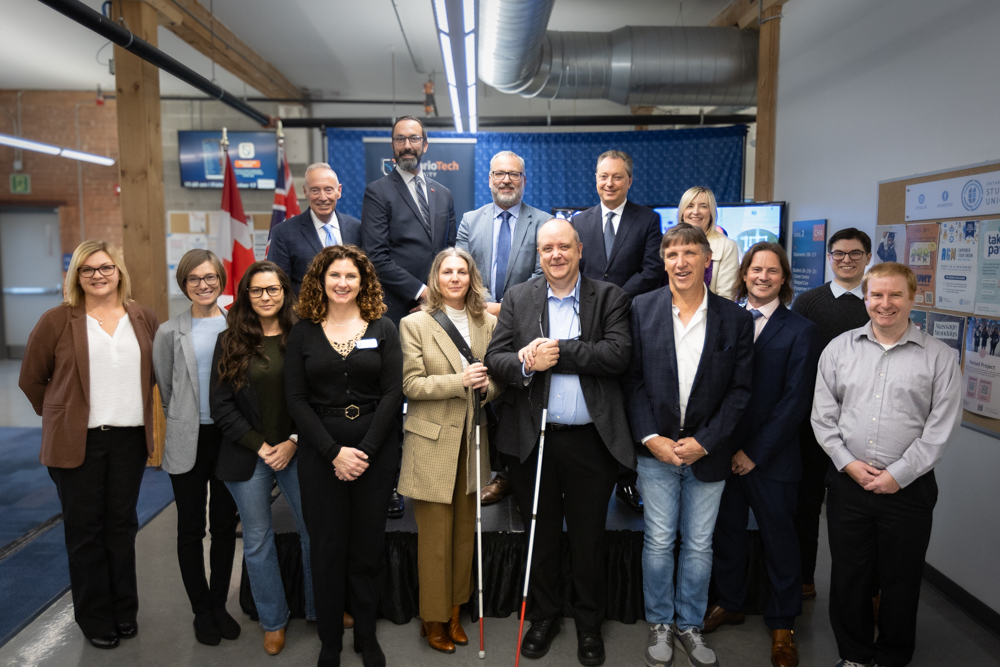Almost 70 per cent of gamers rate stereoscopic 3D experience the same or better than 2D gaming
Two-year iGO3D research findings released to help game developers launch effective titles
March 4, 2013

OSHAWA, ON – The immersive game industry stands on the cusp of dramatic change following two years of specialized research conducted by Interactive Games Ontario 3D (iGO3D), an alliance of Ontario universities and leading game companies launched in early 2011. With total funding valued at C$635,000, iGO3D’s findings include everything from developing a better understanding of stereoscopic 3D (S-3D) gaming to pioneering new techniques in S-3D visual game design.
"It was premature for industry leaders to encourage fixed design choices to determine good and bad 3D in games,” said Dr. Andrew Hogue, Assistant Professor, University of Ontario Institute of Technology (UOIT) and Associate Project Director, iGO3D. “Our research shows we have a lot more to learn. There are still innovations to be made in areas like technology, game design and artistic choice. We found several challenges with what's available today, and iGO3D revealed new techniques and ideas that can positively shape future S-3D games."
First spearheaded by UOIT and the S-3D Gaming Alliance (S3DGA), iGO3D's key partners also include York University, Western University, University of Waterloo and OCAD University. Industry members include Electronic Arts, Big Blue Bubble, Bitheads, JunctionVFX and Digital Extremes. Additional sponsors include AMD, Dynamic Digital Depth, and Audiofly. iGO3D is funded in part by the Ontario Media Development Corporation (OMDC) and the Ontario Centres of Excellence (OCE).
“Game developers are starting to get it and are already taking a closer look at immersive technologies like the Oculus Rift and other virtual reality (VR) devices,” said Neil Schneider, Executive Director, S3GDA. “iGO3D's findings will be a very helpful toolset for them to put out great memorable games.”
iGO3D has showcased a real opportunity for 3D and VR to represent a brand new class rather than just an add-on for video games. One research project involved creating a 3D space shooter/maze game with its design focused around interactions in stereoscopic 3D, to determine whether the additional depth cues allow for new interactions not possible in traditional 2D games. The study found 70 per cent of players were able to complete the game on a 3D display in the first play-through, and all the first-time players gave up and failed when playing on a 2D display.
The iGO3D website is now accepting free registrations from Ontario game development professionals, applicable Ontario industry and S3DGA members. Only qualified registrations will be approved for access. Most of the research documents are supplemented with stereoscopic 3D videos that can also be viewed in traditional 2D if needed. The presentations will work with most available 2D and 3D options in the market.
Research findings include:
- Relationships between stereoscopic 3D and audio
- Perceptual issues and findings in S-3D gaming
- New stereoscopic 3D rendering techniques
- New and effective methods for drawing stereoscopic 3D crosshairs
- Innovations in holographic gaming technology
Special industry presentations have also been made available by Big Blue Bubble and Digital Extremes: two companies with active S-3D game development experience. Researchers and industry representatives are also making themselves available to answer questions about the findings through an included discussion engine.
The iGO3D website will also be revealing its research results for the Fan Expo Battlefield 3 gaming competition. Featuring close to 250 participants, iGO3D has uncovered findings about what gamers think about being able to effectively compete in 3D, and some ideas on how to improve the experience further.
About Ontario Tech University
A modern, forward-thinking university, Ontario Tech advances the discovery and application of knowledge to accelerate economic growth, regional development and social innovation. We inspire and equip our students and our graduates to make a positive impact in a tech-focused world. For us, it’s not only about developing the next tech breakthrough. Understanding and integrating the social and ethical implications of technology differentiates us as university. Learn more at ontariotechu.ca.
Media contact
Bryan Oliver
Communications and Marketing
Ontario Tech University
905.721.8668 ext. 2209
bryan.oliver@uoit.ca



